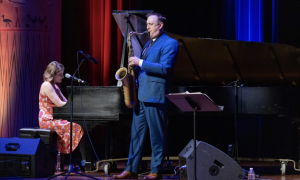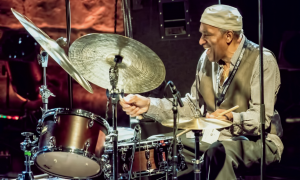Home » Jazz Articles » Catching Up With » My Conversation with David Binney
My Conversation with David Binney
New York City-based saxophonist and composer David Binney has been getting lots of well-deserved attention over the last several years. Three excellent CDs with the unique and hard driving band Lost Tribe, stints with

Medeski Martin & Wood
band / ensemble / orchestrab.1991

Drew Gress
bassb.1959

Gil Evans
composer / conductor1912 - 1988

Edward Simon
pianob.1969
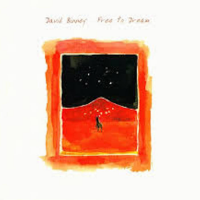 David Binney is known for his rapid-fire attack, monstrous chops, intelligent composing and arranging skills while becoming one of the most sought after session men in The Big Apple. The following interview was conducted specifically for All About Jazz:
David Binney is known for his rapid-fire attack, monstrous chops, intelligent composing and arranging skills while becoming one of the most sought after session men in The Big Apple. The following interview was conducted specifically for All About Jazz: All About Jazz: Who would you cite as your modern day influences (musicians and/or Composers who are still living)?
David Binney:

Wayne Shorter
saxophone1933 - 2023

Bill Frisell
guitar, electricb.1951

Djavan
guitarb.1949

Ivan Lins
piano and vocalsb.1945

Hermeto Pascoal
fluteb.1936

Herbie Hancock
pianob.1940

Bobby Hutcherson
vibraphone1941 - 2016

Bennie Maupin
woodwindsb.1940

Joe Zawinul
keyboards1932 - 2007

Jan Garbarek
saxophoneb.1947

Joe Henderson
saxophone1937 - 2001

Egberto Gismonti
guitarb.1947

Pat Metheny
guitarb.1954

Keith Jarrett
pianob.1945
AAJ: Many factors can contribute to inspiring a musician: the music of others, visual stimuli (literature, cinema, sculpture, painting, nature), Working with interesting peers, maybe even food. Is there any one catalytic element that seems to provide you with the most inspiration?
DB: I would say "all of the above" inspire me at various times. I would say that the most common catalysts for me would be: Listening to great music. Places I've been to including where I grew up in California. And, being single, the highs and lows of a relationship with a woman.
AAJ: How would you assess the audience's reactions to your music and/or involvement with other bands and collaborative projects? Have European or American audiences been more receptive to your music?
DB: Audiences react very positively to my music and to most every project I am part of, luckily! I get to play with some great musicians and this is "key." I find European and American (and Canadian) audiences to be equally receptive and attentive for the most part.
AAJ: What can a musician learn from being told by an audience member (post-performance) that he or she "played exceptionally well" or was "extremely moving" when he or she feels their performance was sub-standard?
DB: I don't know if there is anything to learn from this. I do know that if this situation occurs, and it does, I can usually tell if someone really heard what I was going for, regardless of the performance, or if they really didn't know what they were listening too.
AAJ: What areas of your own playing/composing do you feel need improvement?
DB: If you ask any artist who is really serious about their art, I think the only answer would be "everything."
AAJ: How's Mythology Records going? Are you working on expanded distribution? What lies ahead in the way of recording projects lead by musicians other than yourself?
DB: Mythology is getting a lot of attention from the press and I assume radio soon as we are just now servicing radio. People are not buying the CDs in droves but I think this because no one really knows about it yet. I don't have money to advertise right now. I am burnt on doing business for the label and am just concentrating on playing and composing. I am trying to delegate the business. My mother handles some and it looks like I will soon hook up with
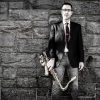
Matt Garrison
saxophoneAAJ: Among the many talented musicians you've worked with, who has presented you with the most challenging and/or synergistic relationship? Who have you learned the most from working with?
DB: That's a hard one to answer because I love everyone I am playing with and it's all challenging to some extent. If I had to mention names I would say, in no particular order, Edward Simon,

Scott Colley
bassb.1963

Kenny Wollesen
drums
Donny McCaslin
saxophone, tenorb.1966

Ben Monder
guitarb.1962

Adam Rogers
guitarb.1965

Uri Caine
pianob.1956

Dave Douglas
trumpetb.1963

Don Byron
clarinetb.1958

Mark Feldman
violinDave Gilmore
guitar
Marvin "Smitty" Smith
drumsb.1961

Jeff Hirshfield
drumsb.1955
AAJ: Who are the musicians you have not yet worked with who would you like to record with and/or tour with?
DB: See the previous list and add " data-original-title="" title="">Squarepusher,

Ralph Towner
guitarb.1940

Jack DeJohnette
drumsb.1942
AAJ: Do you give private saxophone lessons to children? If so, do you think that someday you might be interested in composing music for children?
DB: I don't, and you never know.
AAJ: What is the current operational status of Lost Tribe?
DB: Fully operational. We're playing tonight at the Knitting Factory! We are looking for a new deal and are thinking of doing our own recording and putting out on Mythology.
AAJ: What will 1999 bring in the way of tours and/or recordings? Beyond 1999, what plans or projects would you like to see happen?
DB: Who knows! Right now it looks like I'll be doing nothing but it looked like this last year at this time and '98 turned into an incredibly busy year. I have many ideas. It looks like I will be doing some drum-and-bass stuff with " data-original-title="" title="">Zack Danziger,

Tim Lefebvre
bassb.1968

Jamie Saft
pianoAAJ: Does the phrase "modern jazz" actually have any meaning or significance? If so, where do you see "modern jazz" heading within the next five years? Where will Dave Binney fit into this?
DB: It means nothing to me and I will and won't fit into anything they want to call it!
Tags
Interview
David Binney
Glenn Astarita
Medeski, Martin & Wood
Edward Simon
Mythology Records
Wayne Shorter
Bill Frisell
Djavan
Ivan Lins
Hermeto Pascoal
Herbie Hancock
Bobby Hutcherson
BENNIE MAUPIN
Joe Zawinul
Jan Garbarek
Joe Henderson
Egberto Gismonti
pat metheny
Keith Jarrett
Matt Garrison
Scott Colley
Kenny Wollesen
Donny McCaslin
Ben Monder
Adam Rogers
Uri Caine
Dave Douglas
Don Byron
Mark Feldman
Dave Gilmore
Marvin "Smitty" Smith
Jeff Hirshfield
Squarepusher
Ralph Towner
Jack DeJohnette
Zack Danziger
Tim Lefevre
Jamie Saft
Drew Gress
Comments
PREVIOUS / NEXT
Support All About Jazz
 All About Jazz has been a pillar of jazz since 1995, championing it as an art form and, more importantly, supporting the musicians who make it. Our enduring commitment has made "AAJ" one of the most culturally important websites of its kind, read by hundreds of thousands of fans, musicians and industry figures every month.
All About Jazz has been a pillar of jazz since 1995, championing it as an art form and, more importantly, supporting the musicians who make it. Our enduring commitment has made "AAJ" one of the most culturally important websites of its kind, read by hundreds of thousands of fans, musicians and industry figures every month.




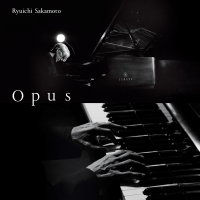



 Buy Now
Buy Now






